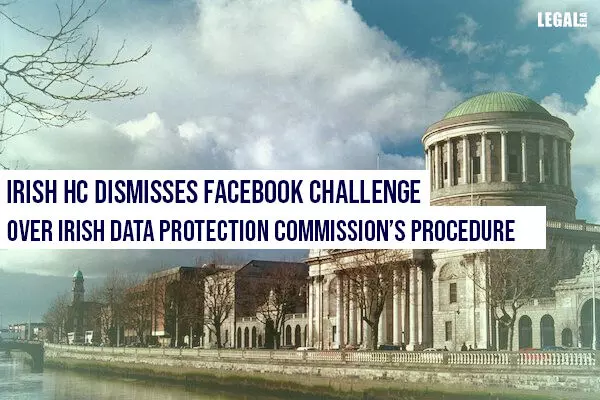- Home
- News
- Articles+
- Aerospace
- Artificial Intelligence
- Agriculture
- Alternate Dispute Resolution
- Arbitration & Mediation
- Banking and Finance
- Bankruptcy
- Book Review
- Bribery & Corruption
- Commercial Litigation
- Competition Law
- Conference Reports
- Consumer Products
- Contract
- Corporate Governance
- Corporate Law
- Covid-19
- Cryptocurrency
- Cybersecurity
- Data Protection
- Defence
- Digital Economy
- E-commerce
- Employment Law
- Energy and Natural Resources
- Entertainment and Sports Law
- Environmental Law
- Environmental, Social, and Governance
- Foreign Direct Investment
- Food and Beverage
- Gaming
- Health Care
- IBC Diaries
- In Focus
- Inclusion & Diversity
- Insurance Law
- Intellectual Property
- International Law
- IP & Tech Era
- Know the Law
- Labour Laws
- Law & Policy and Regulation
- Litigation
- Litigation Funding
- Manufacturing
- Mergers & Acquisitions
- NFTs
- Privacy
- Private Equity
- Project Finance
- Real Estate
- Risk and Compliance
- Student Corner
- Take On Board
- Tax
- Technology Media and Telecom
- Tributes
- Viewpoint
- Zoom In
- Law Firms
- In-House
- Rankings
- E-Magazine
- Legal Era TV
- Events
- Middle East
- Africa
- News
- Articles
- Aerospace
- Artificial Intelligence
- Agriculture
- Alternate Dispute Resolution
- Arbitration & Mediation
- Banking and Finance
- Bankruptcy
- Book Review
- Bribery & Corruption
- Commercial Litigation
- Competition Law
- Conference Reports
- Consumer Products
- Contract
- Corporate Governance
- Corporate Law
- Covid-19
- Cryptocurrency
- Cybersecurity
- Data Protection
- Defence
- Digital Economy
- E-commerce
- Employment Law
- Energy and Natural Resources
- Entertainment and Sports Law
- Environmental Law
- Environmental, Social, and Governance
- Foreign Direct Investment
- Food and Beverage
- Gaming
- Health Care
- IBC Diaries
- In Focus
- Inclusion & Diversity
- Insurance Law
- Intellectual Property
- International Law
- IP & Tech Era
- Know the Law
- Labour Laws
- Law & Policy and Regulation
- Litigation
- Litigation Funding
- Manufacturing
- Mergers & Acquisitions
- NFTs
- Privacy
- Private Equity
- Project Finance
- Real Estate
- Risk and Compliance
- Student Corner
- Take On Board
- Tax
- Technology Media and Telecom
- Tributes
- Viewpoint
- Zoom In
- Law Firms
- In-House
- Rankings
- E-Magazine
- Legal Era TV
- Events
- Middle East
- Africa

Irish High Court dismisses Facebook challenge over Irish Data Protection Commission's procedure
Irish High Court dismisses Facebook challenge over Irish Data Protection Commission's procedure

Irish High Court dismisses Facebook challenge over Irish Data Protection Commission's procedure The Irish High Court dismissed Facebook's challenge over the Irish Data Protection Commission's (DPC) procedures. Through this, Facebook failed to prevent the data protection regulator to order the suspension of its EU-US data flow. The ruling will have a huge impact on Facebook's operation...
To Read the Full Story, Subscribe to Legal Era News
Access Exclusive Legal Era Stories, Editorial Insights, and Expert Opinion.
Already a subscriber? Sign in Now
Irish High Court dismisses Facebook challenge over Irish Data Protection Commission's procedure
The Irish High Court dismissed Facebook's challenge over the Irish Data Protection Commission's (DPC) procedures. Through this, Facebook failed to prevent the data protection regulator to order the suspension of its EU-US data flow.
The ruling will have a huge impact on Facebook's operation whereby it can be ordered to stop taking the information from the EU to the US for processing and store the EU data locally. The case starts when a warning was put to Facebook for suspension of EU-US data flow which Facebook responded by filing for judicial review for obtaining the stay on DPC procedure.
According to Facebook, The ruling was about the process the IDPC followed. The larger issue of how data can move around the world remains of significant importance to thousands of European and American businesses that connect customers, friends, family, and employees across the Atlantic. Facebook also ststed that like other companies, it followed European rules and relied on Standard Contractual Clauses, and appropriate data safeguards, to provide global service and connect people, businesses, and charities. The company is looking forward to defending its compliance to the IDPC, as their preliminary decision could be damaging not only to Facebook but also to users and other businesses.
Europe's top Court followed the landmark judgment last summer striking down the flagship transatlantic agreement on data flow because US mass surveillance is incompatible with EU's data protection regime. Not banning out rightly, CJEU ruled that the data protection agencies must step and suspend international data flow if the EU data is at risk giving the clear signal that the EU-US data flow is a clear risk.
The whole issue rises with the original 2013 complaint made by the European Privacy campaigner Max Schrems. Schrems commenting on the decision said, "We now expect the DPC to issue a decision to stop Facebook's data transfers before summer. This would require Facebook to store most data from Europe locally, to ensure that Facebook USA does not have access to European data. The other option would be for the US to change its surveillance laws."


